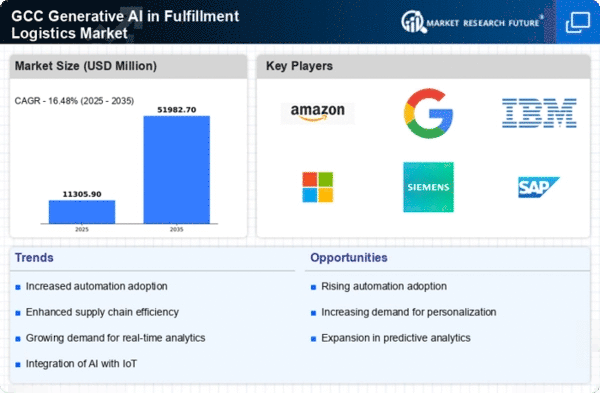Rising E-commerce Demand
The surge in e-commerce activities across the GCC region is a primary driver for the generative ai-in-fulfillment-logistics market. As consumers increasingly prefer online shopping, logistics companies are compelled to enhance their fulfillment capabilities. In 2025, e-commerce sales in the GCC are projected to reach approximately $30 billion, indicating a robust growth trajectory. This demand necessitates the integration of generative AI technologies to optimize inventory management, streamline order processing, and improve delivery times. Companies leveraging AI can analyze consumer behavior patterns, enabling them to predict demand more accurately and adjust their logistics strategies accordingly. Consequently, The generative AI in fulfillment logistics market will likely experience significant growth as businesses strive to meet the evolving expectations of online shoppers.
Rising Consumer Expectations
The evolving expectations of consumers in the GCC region are significantly impacting the generative ai-in-fulfillment-logistics market. Today's consumers demand faster delivery times, personalized services, and seamless shopping experiences. This shift in consumer behavior compels logistics companies to adopt generative AI technologies to enhance their fulfillment processes. For instance, AI can analyze customer data to provide tailored recommendations and improve order accuracy. As a result, logistics providers that leverage AI are likely to gain a competitive edge by meeting these heightened expectations. The generative ai-in-fulfillment-logistics market is thus positioned to grow as companies strive to enhance customer satisfaction and loyalty through innovative AI-driven solutions.
Technological Advancements in AI
The rapid advancements in artificial intelligence technologies are significantly influencing the generative ai-in-fulfillment-logistics market. Innovations in machine learning, natural language processing, and data analytics are enabling logistics providers to enhance operational efficiency. For instance, AI-driven algorithms can optimize routing and scheduling, reducing transportation costs by up to 15%. Furthermore, the integration of AI with Internet of Things (IoT) devices allows for real-time tracking and monitoring of shipments, improving transparency and customer satisfaction. As GCC countries invest heavily in smart technologies, the generative ai-in-fulfillment-logistics market is poised for growth, with companies increasingly adopting AI solutions to remain competitive and responsive to market demands.
Government Initiatives and Support
Government initiatives aimed at enhancing the logistics sector in the GCC are playing a crucial role in driving the generative ai-in-fulfillment-logistics market. Various national strategies focus on improving infrastructure, promoting digital transformation, and fostering innovation within the logistics industry. For example, the UAE's Vision 2021 emphasizes the importance of advanced technologies in logistics, encouraging investments in AI solutions. Such supportive policies are likely to create a conducive environment for the adoption of generative AI technologies, facilitating the growth of the market. As governments allocate funds and resources to modernize logistics operations, the generative ai-in-fulfillment-logistics market is expected to benefit from increased investments and collaborative efforts.
Sustainability and Efficiency Goals
The increasing focus on sustainability and operational efficiency is driving the generative ai-in-fulfillment-logistics market in the GCC. Companies are under pressure to reduce their carbon footprint and optimize resource utilization. Generative AI can play a pivotal role in achieving these goals by enabling more efficient route planning, reducing waste, and improving energy consumption in logistics operations. For instance, AI algorithms can analyze data to identify the most efficient delivery routes, potentially decreasing fuel consumption by up to 20%. As businesses in the GCC prioritize sustainability, the generative ai-in-fulfillment-logistics market is likely to expand, with companies adopting AI technologies to enhance their environmental performance while maintaining operational efficiency.
















